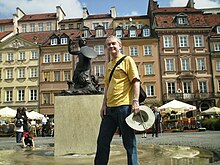Internalism and externalism are two opposite ways of integration of explaining various subjects in several areas of philosophy. These include human motivation, knowledge, justification, meaning, and truth. The distinction arises in many areas of debate with similar but distinct meanings. Internal–external distinction is a distinction used in philosophy to divide an ontology into two parts: an internal part concerning observation related to philosophy, and an external part concerning question related to philosophy.
Truth or verity is the property of being in accord with fact or reality. In everyday language, it is typically ascribed to things that aim to represent reality or otherwise correspond to it, such as beliefs, propositions, and declarative sentences.

Willard Van Orman Quine was an American philosopher and logician in the analytic tradition, recognized as "one of the most influential philosophers of the twentieth century". He served as the Edgar Pierce Chair of Philosophy at Harvard University from 1956 to 1978.
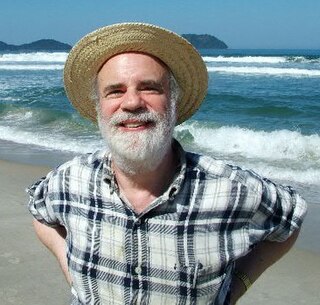
Saul Aaron Kripke was an American analytic philosopher and logician. He was Distinguished Professor of Philosophy at the Graduate Center of the City University of New York and emeritus professor at Princeton University. From the 1960s until his death, he was a central figure in a number of fields related to mathematical and modal logic, philosophy of language and mathematics, metaphysics, epistemology, and recursion theory.

Hilary Whitehall Putnam was an American philosopher, mathematician, computer scientist, and figure in analytic philosophy in the second half of the 20th century. He contributed to the studies of philosophy of mind, philosophy of language, philosophy of mathematics, and philosophy of science. Outside philosophy, Putnam contributed to mathematics and computer science. Together with Martin Davis he developed the Davis–Putnam algorithm for the Boolean satisfiability problem and he helped demonstrate the unsolvability of Hilbert's tenth problem.
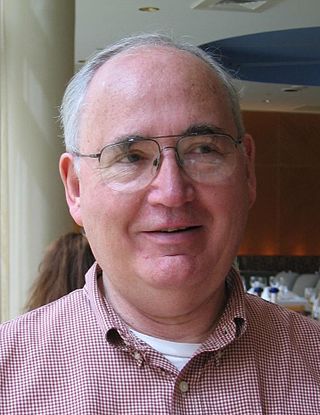
Dana Stewart Scott is an American logician who is the emeritus Hillman University Professor of Computer Science, Philosophy, and Mathematical Logic at Carnegie Mellon University; he is now retired and lives in Berkeley, California. His work on automata theory earned him the Turing Award in 1976, while his collaborative work with Christopher Strachey in the 1970s laid the foundations of modern approaches to the semantics of programming languages. He has also worked on modal logic, topology, and category theory.
Crispin James Garth Wright is a British philosopher, who has written on neo-Fregean (neo-logicist) philosophy of mathematics, Wittgenstein's later philosophy, and on issues related to truth, realism, cognitivism, skepticism, knowledge, and objectivity. He is Professor of Philosophical Research at the University of Stirling, and taught previously at the University of St Andrews, University of Aberdeen, New York University, Princeton University and University of Michigan.
Eliminative materialism is a materialist position in the philosophy of mind. It is the idea that the majority of mental states in folk psychology do not exist. Some supporters of eliminativism argue that no coherent neural basis will be found for many everyday psychological concepts such as belief or desire, since they are poorly defined. The argument is that psychological concepts of behavior and experience should be judged by how well they reduce to the biological level. Other versions entail the nonexistence of conscious mental states such as pain and visual perceptions.

David Kellogg Lewis was an American philosopher. Lewis taught briefly at UCLA and then at Princeton University from 1970 until his death. He is closely associated with Australia, whose philosophical community he visited almost annually for more than 30 years.
In philosophy and logic, a deflationary theory of truth is one of a family of theories that all have in common the claim that assertions of predicate truth of a statement do not attribute a property called "truth" to such a statement.
A semantic theory of truth is a theory of truth in the philosophy of language which holds that truth is a property of sentences.
Hartry H. Field is an American philosopher. He is Silver Professor of Philosophy at New York University; he is a notable contributor to philosophy of science, philosophy of mathematics, epistemology, and philosophy of mind.
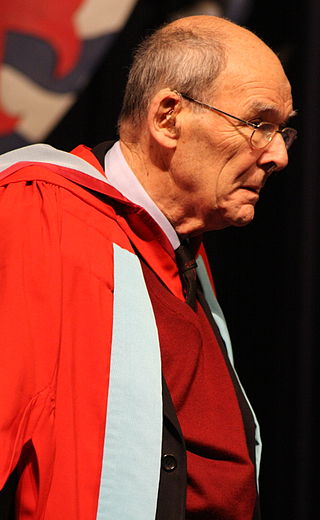
David Malet Armstrong, often D. M. Armstrong, was an Australian philosopher. He is well known for his work on metaphysics and the philosophy of mind, and for his defence of a factualist ontology, a functionalist theory of the mind, an externalist epistemology, and a necessitarian conception of the laws of nature.

Timothy Williamson is a British philosopher whose main research interests are in philosophical logic, philosophy of language, epistemology and metaphysics. He is the former Wykeham Professor of Logic at the University of Oxford, and a fellow of New College, Oxford.

Graham Priest is a philosopher and logician who is distinguished professor of philosophy at the CUNY Graduate Center, as well as a regular visitor at the University of Melbourne, where he was Boyce Gibson Professor of Philosophy and also at the University of St Andrews.
Ernest Sosa is an American philosopher primarily interested in epistemology. Since 2007 he has been Board of Governors Professor of Philosophy at Rutgers University, but he spent most of his career at Brown University.
Paul Montgomery Churchland is a Canadian philosopher known for his studies in neurophilosophy and the philosophy of mind. After earning a Ph.D. from the University of Pittsburgh under Wilfrid Sellars (1969), Churchland rose to the rank of full professor at the University of Manitoba before accepting the Valtz Family Endowed Chair in Philosophy at the University of California, San Diego (UCSD) and joint appointments in that institution's Institute for Neural Computation and on its Cognitive Science Faculty.
John Patrick Hawthorne is an English philosopher, currently serving as Professor of Philosophy at the Australian Catholic University in Melbourne, and Professor of Philosophy at the University of Southern California. He is recognized as a leading contemporary contributor to metaphysics and epistemology.
Kim Sterelny is an Australian philosopher and professor of philosophy in the Research School of Social Sciences at Australian National University and Victoria University of Wellington. He is the winner of several international prizes in the philosophy of science, and was previously editor of Biology and Philosophy. He is also a member of the Australian Academy of the Humanities. He is currently the First Vice President of the Division for Logic, Methodology and Philosophy of Science and Technology of the International Union of History and Philosophy of Science and Technology (2020–2023).
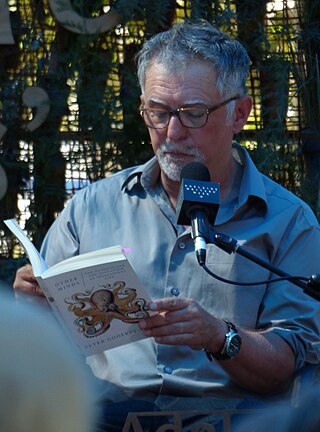
Peter Godfrey-Smith is an Australian philosopher of science and writer, who is currently Professor of History and Philosophy of Science at the University of Sydney. He works primarily in philosophy of biology and philosophy of mind, and also has interests in general philosophy of science, pragmatism, and some parts of metaphysics and epistemology. Godfrey-Smith was elected to the American Philosophical Society in 2022.
